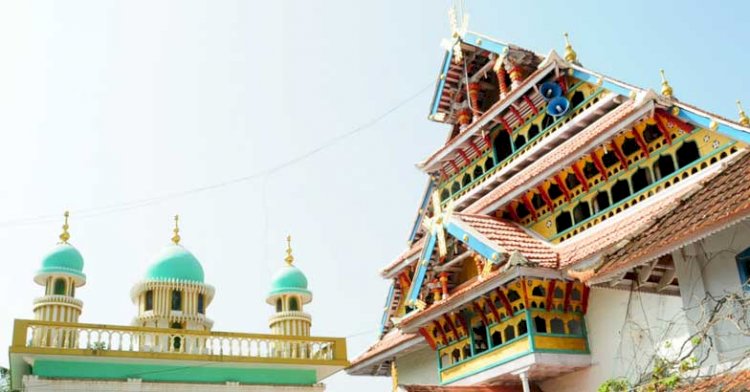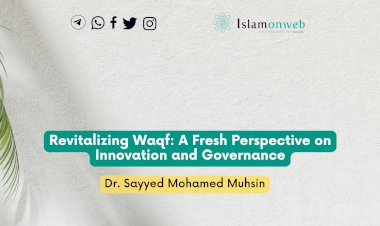Role of Kerala State Waqf Board, Mutawallīs/Mahall Committees (Part Three)
Maqāṣid, as it refers to the higher objectives of Sharīʿiah, fashions the roadmap for any activity in Islam. The case of Waqf is also not different. It can be applied no matter whether the country is Muslim-majority or not. The depth and size of the application may be different according to the respective areas, efforts made, visions of the leadership, etc. As far as Kerala is concerned, Islam is the second-largest practised religion in Kerala (26.56%), next to Hinduism. Being a minority in a secular country, implementing Islamic principles and directions has limitations. However, the Maqāṣid-based framework is all-encompassing and inclusive of all situations. Therefore, by having a thorough comprehension of the context and Maqāṣid, the concerned parties can formulate the best possible and suitable format for the application of Maqāṣid in the respective areas.
In light of the current study, the Kerala State Waqf Board and Mutawallī/Mahall committee are the two major forces in the success and failure of achieving the goals of Waqf. Therefore, in the coming section, the potential role of the Kerala State Waqf Board and the Mutawallī/Mahall committee in the actualization of maqāṣidic governance of Waqf will be analysed.
The application of Maqāṣid to the Waqf board begins with the judicious selection of members, considering their credentials and qualifications and detaching from the political or regional interests. Waqf is an Islamic institution. Shariah’s interests warrant to be the yardstick in the selection criteria. An ideal board needs members from various educational backgrounds, particularly Islamic jurisprudence, Islamic economics, waqf laws and governance. Religious orientation, trustworthiness, and commitment should be the priority of selection criteria. An expert in the Indian laws related to Waqf will be highly helpful in avoiding the legal complications and organizing the work in conformity with the legal system of the country.
Currently, in the selection and nomination of Board members, the abovementioned aspects are being overlooked, which causes a drawback to the trust and credibility of the Board’s decisions. Presently, the members are selected based on their political affiliation. At the end of 2021, some Muslim organizations in Kerala protested against the Kerala government’s decision to hand over State Wakf Board appointments to the Public Service Commission (PSC) because non-Muslims would also get positions on the Board.[i] This decision appears against the maqāṣidic governance as Waqf is not only a philanthropic enterprise but also has religious content. To sum up, the Waqf Board members must have the qualities to lead the Waqf.
Next, during the random discussion with some position holders in Mahall committees in Kerala, the researcher found that neither the mutawallī/Mahall committee nor the regional Muslim leaders, let alone the public, have a clear understanding of the Board and its activities. It consequently affects trust and confidence in the decisions, proposals, projects and regulations made by the Board. This issue can be tackled if the Board launches campaigns collaborating with the leading religious and social organizations, thus reaching out with its creative and innovative missions to the ground level of the Muslim community.
Accountability and transparency, which are vital terms in maqāṣidic governance, need to be prevalent in the functioning of the Board to improve the credibility of the institution and enhance the confidence of stakeholders. It needs to implement a systematic accounting process, including annual income, expenditures, and waqf assets increment. To efficiently manage waqf accounting, it is proposed to establish accounting standards coupled with periodic (preferably quarterly) auditing for Waqf.[ii] By having a waqf accounting and auditing system in place, the performance of the mutawallī/Mahall committee can be monitored, and their work will be more transparent.[iii] Both state-level administration and local management need to be free from corruption.
The system should be enhanced to administer waqf property, distribute property, disburse resulting revenue, and protect it from encroachment. Waqf needs to be dealt with as a social responsibility. Nissar Commission, which was appointed by the LDF government in 2007, had filed a report revealing that 676 acres of wakf land in Kerala had been illegally sold or transferred to private parties. The Board needs to be strict in protecting the waqf properties by getting alternative grounds if the waqf lands are used for public purposes, taking action against the illegal encroachments of waqf lands, and ensuring the implementation of the Land Acquisition Act. Waqf Board needs to recover all of the illegally occupied waqf properties and utilize them to benefit the intended beneficiaries. Preservation of the waqf properties (hifẓ al-māl) from all sorts of misappropriation and misuse is a significant aspect of Maqāṣidic governance. The Waqf Board can play its inevitable role in retrieving the unlawfully occupied waqf lands from exploitation.[iv]
At times, the waqf cases are delayed, which also causes damage to the waqf governance. Therefore, a period needs to be specified in cases of waqf matters for the judgements. In the Wakf Tribunal, cases and disputes related to waqf in Kerala are settled by a single panel that deals only with waqf related issues.
In addition, the researcher would like to reiterate some legal issues present in the Indian Waqf laws, which need to be addressed by the Central Waqf Council and state waqf boards. Anwar Aziz and Jawwad Ali (2018) referred to these issues as given below:[v]
- There is a special provision in law to vacate Waqf properties for public purposes. The government promised a similar law to tackle illegal encroachments on the Waqf lands. Still, unfortunately, this was not included in the Waqf Act or any particular bill separately presented in this regard (Rehmani, 2014).
- In the event of any conflict regarding the Waqf properties, an appeal is to be made to Waqf Tribunal (Waqf Act, 1954; Rashid, 2011), But no period is determined for the Tribunal to the judgment. Although, the period for the Tribunal to issue the judgment should be bounded to six months or not more than a year. (as demanded by All India Muslim Personal Law Board) (AIMPLB) (Rizwi, 2014).
- According to the law, if the government acquires any Waqf property, they need to pay for it as per its market value. The government has recently passed the Land Acquisition Act, according to which the compensation for the land acquired in urban areas would be two times the market value and four times if the land acquisition is in a rural area, which should apply to Waqf land as well (Rehmani, 2014).
- The structure of Waqf Boards instituted by the government consists of more of its nominated representatives than the number of the representatives elected from among the Muslims themselves. The bitter experience of the Muslims so far in this regard leads them to reconsider this structure rightly. (Rehmani, 2014)
The abovementioned matters are among the legal constraints in waqf management, which need to be settled. Otherwise, it will hinder the way of achieving a maqāṣidic governance of Waqf in the State.
Last but not least, the engaging, open, trustworthy and dynamic relationship between the Waqf Board and the mutawallī/Mahall committee is the essential brick in the format of maqāṣidic governance. In light of the current study, the appearance of the former is unwelcome for the latter because of the perception that the Waqf board is of no use other than unpleasant collecting seven per cent of the income. This perception needs to be breached by highlighting the Board’s activities and proposing innovative social and educational welfare projects. In this regard, the appointment of a skilled coordinator in each Mahall for bridging between the Board and local management is highly recommended. The coordination has to engage in a conducive way for both parties.
Role of Mutawallīs/Mahall Committees in Kerala
Mutawallīs, addressed in the Act 1954 as a manager and caretaker of Waqf property, are the immediately responsible party for the waqf management. They have a central role in the success and failure of the waqf administration. In several places in Kerala, waqf management is carried out by the Mahall committees, representing the mutawallīs. Mahall means a social format of Muslims of particular localities in Kerala by dividing the areas, including a Jumuʿah Mosque and its committee. The committee leads most collective rituals that are supposed to be done where Muslims live and organize various Islamic programs. Almost all places where Muslims live in Kerala have a separate Mahall system and committees. As far as Waqf is concerned, the mutawallī/Mahall committee is deemed the authorized local waqf management.
It is noted that the root cause of several problems related to waqf management in Kerala is because of the negligent behaviour of the mutawallīs.[vi] They are responsible for the unfortunate scenarios that occurred to the Waqf; over the years, “a large number of awqāf properties were expropriated, lost, or remained undeveloped or under-utilized, and the latent wealth of awqāf remains largely untapped“.[vii] They were leasing out the waqf properties without following procedures, thus damaging an essential social and religious institution. The amended Waqf Act 2013 specifies that a mutawallī is entitled to give Waqf property on lease for one year with the permission of the Waqf Board. The Waqf Board alone is competent to lease the property for up to 3 years and up to a maximum period of 30 years, with the permission of the State Government (Waqf act 2013, Sec, 56).
The custom in early history, the endower himself was doing the duties of waqf management. In other words, wāqif and mutawallī used to be the same person. Otherwise, he would choose an individual known for honesty, and dignity as a mutawallī. Mutawallīs’s primary duties are protecting waqf assets from encroachments, their maintenance and their revenue distribution to the deserving people, i.e., entitled beneficiaries. However, mal-administration, mismanagement, misuse and negligence of waqf properties by mutawallīs are reported on a large scale. If the Waqf remains without any benefit, the Muslim community in general and mutawallīs and other authorities in particular, are accountable.
Mutawallī has a contractual relationship with the endower and a fiduciary relationship with mawqūf ʿalayhi. To both parties, the mutawallī works based on trust to act and manage waqf assets on behalf of the endower. Mutawallī can be deemed as a trustee. The accountability of mutawallī in discharging his responsibilities is the cornerstone for the empowerment of Waqf, a noble, social and religious institution in Islam. To ensure the work’s credibility and transparency, a system needs to develop for reporting income and expenditure every year, with plans about using waqf endowment and generating revenue for the beneficiaries—specific qualifications for appointment as mutawallī to be set in relevant laws.
Under Sec. 44, 45, 46, and 47 of the Waqf Act 1995, mutawallīs are liable to be audited of their accounts at the discretion of the State Government and to send the statements to the Waqf Board. But, because of the lack of the elements such as a precise work plan, regulations, legal administration, and timely action, many mutawallīs are not executing their duties and following the guideline of the waqf act.[viii] Also, since the Waqf management takes a long time (typically 3-5 years) to provide annual reports, it ends up submitting outdated notices. Therefore, making reports at shorter intervals (quarterly, for example) and requiring external auditing yearly seems to be mandatory.[ix] Studies prove that mutawallīs are often overlooked their responsibilities. Previously in history, mutawallīs were scholars and learned jurists with the understanding of Sharīʿiah; therefore, they acceptably discharged their duties. In contemporary times, mutawallīs need to be educated about their religious and social duties from an Islamic perspective. For achieving this, special training sessions need to be organized by the Waqf Board.
As part of hifz al-mal, the committees are bound to cultivate, flourish, and maximize the use and benefit of Waqf assets/properties/lands. If they are left unused, the immediately responsible party is mutawallī/committees. It becomes the breach of maqāṣidic governance of Waqf, which in essence is against the teachings of Sharīʿiah. Increasing income through investments is one of the ways to reach out to a good number of beneficiaries and improve their quality of life.
Mutawallī is deemed as a Khalifah to ensure adequate operation of Waqf. The paramount duty of mutawallī is to fulfil the goals and benefits specified in Waqf by wāqif. Also, protecting the interests of beneficiaries related to the Waqf is the duty of mutawallī. Mutawallī has discretionary power to identify the causes of damage and reach pragmatic solutions. Mutawallī should oversee and supervise the administration and management of waqf properties. Mutawallīs should make plans to utilize the underused waqf properties in modern times. Mutawallīs should be systematically trained to fathom the Sharīʿiah injunctions, higher objectives of the Waqf, legal requirements/technicalities of respective lands and needs of the time. In general, he must be instrumental in the actualization of the Maqāṣid of Waqf by looking after and managing the waqf property.
For achieving the Maqāṣid of Waqf, the activity and commitment of Mahall committees and mutawallīs need to be enhanced. If they work correctly and regularly, it will help create a good income for running the masjid, madrassa and other social welfare projects. The self-sufficiency of religious institutions is essential in preserving faith (hifẓ al-dīn).
In addition, a detailed survey of existing waqf assets is to be conducted in each Mahall, and they should be documented. It is crucial for preserving Waqf from encroachments and utilization for further benefits. Also, as stipulated by the endowers, the beneficiaries need to be studied and checked, and their record needs to be prepared. It is vital for the distribution of waqf income to the deserving people. Such surveys should be mandated yearly.
Mahall committees can ensure the maqāṣidic governance of Waqf by appointing trained, skilled, and committed employees to administer and manage the waqf assets, generate income, and then distribute them to the deserving group of people. Imams and khaṭībs of Mahall committees can make the local management and members in general aware of the rights and duties related to Waqf. Specific credentials must be specified for the appointees. Some authority must be charged with reviewing and approving appointments.
After paying seven per cent of the board’s income to the Waqf Board, the mutawallī/Mahall committee must spend the rest of the amount for achieving the goals specified by the waqif and to maximize the net benefit of Waqf income. The person undertaking the duties of waqf management is entitled to the remuneration fixed by the wāqif or the Board. In contemporary times, the Mahall committee should specify and provide compensation for employees to ensure efficient governance. If otherwise, the duties will be discharged as a charity, in which accountability and efficiency will be compromised, which is against the maqāṣidic governance. Some appointees may wave their salaries voluntarily. However, this should in no way reduce accountability and quality of service.
Likewise, in the light of the current study, the researcher found that mutawallīs/committees are not aware of the advantages and opportunities put forth by the Waqf Board, such as loans, grants, financial assistance, and opportunities for the lease. The appointed employee or the coordinator needs to bring the benefits given by the Board to their places and distribute them to the deserving parties. This mutuality between Board and mutawallīs/committees is crucial in the implementation of maqāṣidic governance.
Last but not least, in the light of the current study, the researcher found that mutawallīs in several places are too old or physically weak to take care of the waqf properties. Some of them do not attend the programs organized by the Waqf Boards either. They do not allow nor assign others to represent them, causing damage to the noble institution of Waqf. As a result, waqf management has become inefficient, and the properties are left behind. This problem can be settled by assigning the duties to a capable representative. Mahall committees need to heed this problem and assign representatives whenever necessary. Appointments of employees and committee members must be for specific periods and subject to periodic review.
(This article is part of a research work which was originally published on AWQAF Journal, 22 (42). pp. 13-44. ISSN 1609-4662, published from Kuwait).
Endnotes:
[i] https://timesofindia.indiatimes.com/city/kozhikode/waqf-board-postings-muslim-league-warns-of-legal-action-against-kerala-government-calls-meeting/articleshow/87695336.cms
[ii] Siti Rokyah Md. Zain. (2005). Determinants of financial reporting practices on WAQF by Malaysian state Islamic religious Council in Malaysia. Unpublished MA dissertation. International Islamic University Malaysia, Kuala Lumpur.
[iii] Abdul Rahim Abdul Rahman, Mohamad Daud Bakar, and Yusuf Ismail. (1999). Current practices and administration of WAQF in Malaysia: A preliminary study. Awqaf Report-Malaysia.
[iv] Interview by the researcher with Sayyid Rasheed Ali Shihab, the former chairman of Kerala State Waqf Board, March 27, 2022.
[v] Anwar Aziz & Jawwad Ali, “Comparative Study of Waqf Institutions Governance in India and Malaysia”, Intellectual Discourse, Special Issue (2018), 1239-1240.
[vi] Asisah S. Rashid, R. (2015). Towards improvement of the rights and duties of mutawallī and nazir in the management and administration of Waqf assets. ISBN 978-967-394-230-5 [proceedings of idmac2015].
[vii] Abdel Mohsin, M. I. (2009). Family Waqf: Its Origin, Law Prospects. Paper Presented at the Waqf Laws and Management: Reality and Prospects, Kuala Lumpur.
[viii] Ahmed, H., & Khan, A. (1998). Strategies to develop waqf administration in India (No. 50). The Islāmic Research and Teaching Institute (IRTI).
[ix] Hasan, R., Alhabshi, S. & Yusoff, A. (2017). Towards Providing the best Sharī’ah Governance Practices for Waqf Based Institutions. Al-Shajarah: Journal of the International Institute of Islāmic Thought and Civilization (ISTAC). March 2018. http://journals.iium.edu.my/shajarah/index.php/shaj/article/view/614.
About Author:
Sayyed Mohamed Muhsin is an assistant professor of Islamic jurisprudence at International Islamic University (IIUM), Kuala Lumpur. He also serves as Editor-in-Chief of Islamonweb-English
Disclaimer
The views expressed in this article are the author’s own and do not necessarily mirror Islamonweb’s editorial stance.
























Leave A Comment